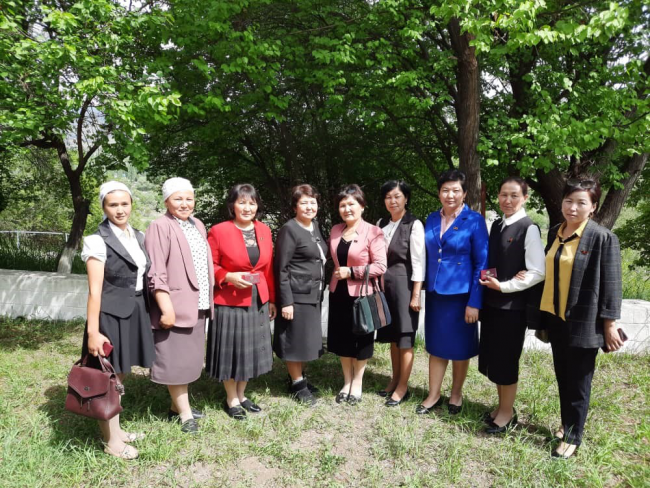Leadership School for Women Candidates in Kyrgyzstan Local Elections 2021

On April 11, 2021, the elections to local councils in 420 out of 452 municipalities, including Bishkek and Osh cities, were held throughout the country. With the purpose to contribute to increase women`s participation in the competition for the local councils’ seats, the Public Service Improvement Project organized a three-day “Leadership School for Local Councils’ Women Candidates” for potential women candidates in 24 project municipalities of the Issyk-Kul and Jalal-Abad regions with the follow-up one-month long mentorship program.
65 women (29 from Issyk-Kul and 36 from Jalal-Abad) out of 165 applications were selected to participate in the School. The selected participants represented all the project municipalities.
The “Leadership School for Women candidates in Local Elections” was aimed to provide the women not only with the one-time theoretical knowledge but also with practical consultations to support women candidates during the entire elections process. For this purpose, first, the intensive three-day program included thematic sessions dedicated to the amendments in the Law of the Kyrgyz Republic "On the Election of Deputies of Local Kenesh" (the 30-percent quota for women in local councils), the LSGs` functions and responsibilities of local deputies. In addition, the women learnt about leadership and effective communication skills, as well as about the registration procedures for running the elections and preparation of the individual pre-election information campaigns with relevant political programs. Secondly, the mentorship program included the provision of practical consultations via mobile phone calls, ZOOM meetings, WhatsApp messages as well as through email addresses. In total 4 online consultations via ZOOM and 146 hours of consultations (77 hours with Jalal-Abad participants, 69 hours for Issyk-Kul participants) were conducted for women in both project regions. Moreover, upon the request of the participants it was decided to keep the created Whatsapp groups, so that women could continue sharing their experiences during their work as deputies. As a result,
- 56 (86%) (22 from Issyk-Kul (76%), 34 (94%) from Jalal-Abad) out of 65 participants decided to run the elections and registered themselves in respective territorial election commissions (TECs).
- 34 (61%) (15 from Issyk-Kul (68%), 19 (56%) from Jalal-Abad) out of 56 registered participants in respective TECs were elected as members of local councils.
- 9 (19%) women candidates stepped down to run the elections due to the various circumstances (mostly, family reasons).
Since it was the first time that the municipalities had applied the Law for reserving a mandate for women, all the participants noted the importance and timeliness of the event. They emphasized the fact that they were successful due to the knowledge and guidance provided by the trainers and did not resort to such measures that went beyond the legality of the campaign. According to their comments, they were able to gain the trust of the population through competent campaigning, through correctly presenting their electoral programs to their voters.
Gulzat Chotoyeva (49 years old, JA region, Toktogul district, Ketmen-Tobo AA) has described her experience in the following way: “The school gave me great support in the election process. I felt a constant support from the trainers and received answers to all my questions. I was able to organize the election campaign very well. If you look at the voting results, there were over 300 voters who voted for me. Of those, there can be no more than 30 relatives. The rest are all my voters who believed in my election program and appreciated my previous contributions. I did everything in adherence to the law as I was taught in our trainings. I did not engage in bribery. Despite the attempts of people to vote for their clan, acquaintances, and relatives, rather than potential deputies of the local council, I could get 300 votes. And that is my main success.”
Gulnara Bostonova (57 years old, JA region, Ala-Buka district, Ak-Jol AA): I conducted my pre-election campaign without violating the law. I used the knowledge I received during the consultation. I raised the vital issues of the village and demonstrated the ways of solution for that problems depending on the competency of the local council and authorities. I conducted meetings with voters in every village, and tried to be a good example for other candidates and members of the local community to achieve good results without breaking the law and bribing voters.
It is worth noting that, unfortunately, a number of women from the younger generation (ages 28-35) with promising plans were not able to get enough votes. Despite their loss, the women expressed their gratitude to the project for the knowledge and experience they gained, which will be useful to them in the future.
Zarema Urdolotova (31 years old, IK region, Jeti-Oguz district, Kyzyl-Suu AA): I didn't win the local council elections, but I became a real leader thanks to the Women Leadership School. It was a very useful experience in terms of engaging with local community, listening to the voices of people and being able to show myself, my knowledge and abilities as a true leader. At the moment I participate in various events and become a member of different local initiatives. Through my active work I hope that I will be prepared to take part in the next local council elections after 4 years.
It is to be reminded that "Leadership School for Local Councils’ Women Candidates" is organized in terms of the "Public Service Improvement" Project, financed by the Government of Switzerland through the Swiss Agency for Development and Cooperation (SDC) and implemented by Helvetas and the Development Policy Institute. Through the aforementioned activities as well as the mechanism of reserving 30% quotas for women guaranteed by Law, the Project aspired to encourage as many women as possible to participate in the elections to local councils and reach the 30-% quota.

